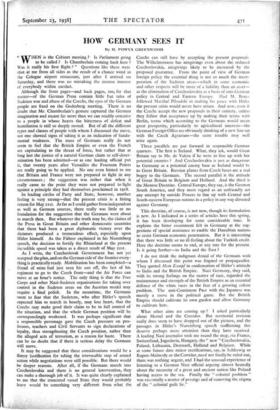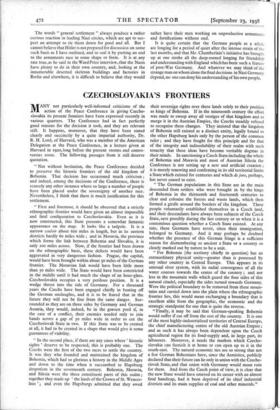HOW GERMANY SEES IT
By H. POWYS GREENWOOD
" WHEN is the Cabinet meeting ? Is Parliament going to be called ? Is Chamberlain coining back here ? Was it really his first flight ? " Questions like these were shot at me from all sides as the result of a chance word in the Cologne airport restaurant, just after I arrived on Saturday, and there was no mistaking the intense interest of everybody within earshot.
Although the front pages—and back pages, too, for that matter—of the German Press contain little tut tales of Sudeten woe and abuse of the Czechs, the eyes of the German people are fixed on the Godesberg meeting. There is no doubt that Mr. Chamberlain's gesture captured the German imagination and meant far more than we can readily conceive to a people in 'whose hearts the bitterness of defeat and humiliation is still so deeply rooted. But of all the different types and classes of people with whom I discussed the move, not one showed signs of taking it as an indication of funda- mental weakness. The mass of Germans really do not seem to feel that the British Empire or even the French are capitulating to the threat of force, but rather that at long last the justice of a natural German claim to self-deter- mination has been admitted—or as one leading official put it, that twenty years after Versailles the Fourteen Points are really going to be applied. No one even hinted to me that Britain and France were not prepared to fight in any circumstances ; the suggestion was rather that when it really came to the point they were not prepared to fight against a principle they had themselves proclaimed in 1918.
In leading circles of Party and State, however, another feeling is very strong—that the present crisis is a fitting return for May 21st. As far as I could gather from independent as well as German sources, there really was little or no foundation for the suggestion that the Germans were about to march them, But whatever the truth may be, the claims of the Press in Great Britain and other democratic countries that there had been a great diplomatic victory over the dictators produced a tremendous effect, especially upon Hitler himself. As the Fiihrer explained in his Nuremberg speech, the decision to fortify the Rhineland at the present incredible speed was taken as a direct result of May zrst.
As I write, the Czechoslovak Government has not yet accepted the plan, and on the German side of the frontier every- thing is practically ready. Mobilisation has been completed—a friend of mine had just seen his son off, the last of his regiment to go to the Czech front—and the Air Force can move at an hour's notice. The only thing is that the Free Corps and other Nazi-Sudeten organisations for taking over control in the Sudeten areas on the Austrian model may require a final polish. In the meantime, the Germans seem to fear that the Sudetens, who after Hitler's speech expected him to march in hourly, may lose heart, that the Czechs may make good their claim to be in full control of the situation, and that the whole German position will be correspondingly weakened. It was perhaps significant that a responsible personage gave the Czech pressure on pro- fessors, teachers and Civil Servants to sign declarations of loyalty, thus strengthening the Czech position, rather than the alleged acts of terrorism, as a reason for haste. There can be no doubt that if there is serious delay the Germans Will move.
It may be suggested that these considerations would be a flimsy justification for taking the irrevocable step of armed action while negotiations were still possible. But there would be deeper reasons. After all, if the Germans march into Czechoslovakia and there is no general intervention, they can make a thorough job of it. It was quite clearly explained to me that the trimcated vassal State they would probably leave would be something very different from what the Czechs can still have by accepting the present proposals. The Wilhelmstrasse has misgivings even about the reduced Czechoslovakia, misgivings likely to be increased by the proposed guarantee. From the point of view of German foreign policy the essential thing is not so much the incor- poration of the Sudeten areas—which in some economic and other respects will be more of a liability than an asset— as the elimination of Czechoslovakia as a basis of anti-German policy in Central and Eastern Europe. Had M. Benes followed Marshal Pilsudski in making his peace with Hitler the present crisis would never have arisen. And now, even if the Czechs accept the new proposals in their entirety, unless they follow that acceptance up by making their terms with Berlin, terms which according to the Germans would mean great prosperity, particularly to agricultural interests—the German Foreign Office are obviously thinking of a new line-up with the Czech Agrarians—the same trouble may well arise again.
Three parallels are put forward in responsible German quarters. The first is Ireland. What, they ask, would Great Britain say to Mr. de Valera if he were to line up with her potential enemies ? And Czechoslovakia is just as dangerous to Germany as a potential enemy base as Ireland would be to Great Britain. Russian planes from Czech bases are a real bogey to the Germans. The second parallel is the attitude of Great Britain to Belgium and Holland. And the third is the Monroe Doctrine. Central Europe, they say, is the German South America, and they must regard as an unfriendly act any attempt by outside Powers to line up with Central and South-eastern European nations in a policy in any way directed against Germany.
This doctrine, of course, is not new, though its formulation is new. As I indicated in a series of articles here this spring, it has been developing for some considerable time. It explains the bitter resentment felt in Germany at the sug- gestions of special assistance to enable the Danubian nations to resist German economic penetration. But it is interesting that there was little or no ill-feeling about the Turkish credit. Here the doctrine seems to end, at any rate for the present. Is it going further—to India and the East ?
I do not think the indignant denial of the Germans with whom I discussed this point was feigned or propagandist. They quoted Man Kampf in confirmation of Hitler's attitude to India and the British Empire. Nazi Germany, they said, with its strong feelings on the matter of race, regarded the maintenance and strength of the British Empire as an essential defence of the white races in the face of a growing colour problem. The anti-Comintern Pact with the Japanese was merely a move in the political game. But the British Empire should cultivate its own garden and allow Germany to cultivate hers.
What other aims are coming up ? I asked particularly about Memel and the Corridor. But territorial revision really does seem to have dropped out of the picture, and the passages in Hitler's Nuremberg speech reaffirming this deserve perhaps more attention than they have received. A leading Nazi journalist took me round the map, via France, Switzerland, Jugoslavia, Hungary, the " new " Czechoslovakia, Poland, Lithuania, Denmark, Holland and Belgium. While at some future date minor rectifications, say, in Schleswig or Eupen-Malmedy or the Corridor, need not finally be ruled out, there was nothing urgent, and I had the unusual experience of listening to a German Nazi official arguing almost heatedly about the necessity of a great and ancient nation like Poland having access to the sea. Finally the " colonial problem " was essentially a matter of prestige and of removing the stigma of the " colonial guilt lie." The words " general settlement " always produce a rather curious reaction in leading Nazi circles, which are apt to sus- pect an attempt to tie them down for good and all. But I cannot believe that Hitler is not prepared for discussion on some such basis as I have outlined, and to seal it by putting an end to the armaments race in some shape or form. It is at any rate true, as he said in the Ward Price interview, that the Nazis have plenty to do in their own country, and, looking at the innumerable deserted skeleton buildings and factories in Berlin and elsewhere, it is difficult to believe that they would rather have their men working on unproductive armament and fortifications without end.
It is quite certain that the German people as a whole are longing for a period of quiet after the intense strain of the last months, and that Mr. Chamberlain's initiative has brought up at one stroke all the deep-rooted longing for friendship and understanding with England which has been such a feature of post-War Germany. And whatever we may think of the strange man on whom alone the final decisions in Nazi Germany depend, no one can deny his understanding of his own people.







































 Previous page
Previous page